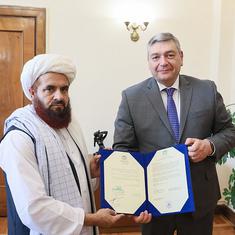COP26: On India’s intervention, climate pact pledges to ‘phase down’ instead of ‘phase out’ coal
Several countries said they were disappointed by the change of language in the pact suggested by India.

The 2021 United Nations Climate Change Conference, also known as COP26, on Saturday recognised India’s intervention to “phase down” rather than “phase out” use of coal as a fuel. This came a day after India had proposed this change in the agreement of the Glasgow Climate Pact, which was signed by 200 countries.
However, the proposal to make the change in the agreement has faced opposition from several countries.
Australian climate scientist Bill Hare said India’s last-minute recommendation of changing the climate pact’s language was shocking, AP reported. “India has long been a blocker on climate action, but I have never seen it done so publicly,” he said.
Tina Stege, climate envoy for the Marshall Islands said that the pact was not perfect, according to The Guardian.
“The coal change and a weak outcome on loss and damage are blows,” she said. “But it is real progress and elements of [it] are a lifeline for my country. We must not discount the crucial wins covered in this package.”
Union Environment Minister Bhupender Yadav has defended India’s push to “phase down” the use of fossil fuels, saying that developing countries could not promise to “phase out” coal and fossil fuel subsidies as they are dealing with the agenda of development, PTI reported.
Key takeaways from summit
The COP26 climate summit that had started on October 30 concluded on Saturday. Here are some key takeaways from the international conference:
- The countries attending the summit expressed concern about human activities causing 1.1 degree Celsius of global warming, impacts of which are being felt in every region. The climate pact reaffirmed the long-term goal to hold the increase in the global average temperature below 2 degree Celsius. It added that limiting global warming required reduction in global greenhouse gas emissions, including reducing carbon dioxide emissions by 45%.
- The climate pact urged the countries to scale up their provision of climate finance, technology transfer and capacity-building for adaptation so as to respond to the needs of developing countries.
- The countries attending the conference called upon multilateral development banks and the private sector to enhance “mobilization in order to deliver the scale of resources needed to achieve climate plans”.
- The pact urged the countries to scale up the deployment of clean power generation and energy efficiency measures, including phasing down of coal power and phasing out of inefficient fossil fuel subsidies.
- It was also pointed out that developed countries did not meet the $100 billion climate finance, deadline for which was 2020. The pact has requested the developed countries to assimilate the amount by 2025.
‘Progress not enough’
The international community has said that the goals set by the Glasgow Climate Pact will not be enough to combat climate change.
“COP26 has made some progress, but nowhere near enough to avoid climate disaster,” said Mary Robinson, former United Nations commissioner for human rights, The Guardian reported. “While millions around the world are already in crisis, not enough leaders came to Glasgow with a crisis mindset. People will see this as a historically shameful dereliction of duty.”
United Nations Secretary-general António Guterres said that more work was needed to improve the climate conditions.
“Our fragile planet is hanging by a thread,” he said. “We are still knocking on the door of climate catastrophe. It is time to go into emergency mode – or our chance of reaching net zero [emissions] will itself be zero.”
Mohamed Adow, director of the Nairobi-based think tank Power Shift Africa, said that the outcome of the COP26 climate summit “contains the priorities of the rich world”.
Climate activist Greta Thunberg said that the real work in saving the environment took place outside the halls of climate conferences.
“Unless we achieve immediate, drastic, unprecedented, annual emission cuts at the source then that means we’re failing when it comes to this climate crisis,” she said in a tweet.









